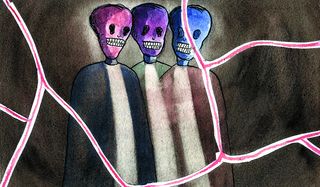Though 2,000 times smaller than a grain of salt, the coronavirus flies straight into the heart of darkness, and greatness, exposing the true character of peoples and nations. Among world leaders, German Chancellor Angela Merkel scored high, staying true to her character—wise and restrained—speaking little and doing much to prepare her country. Thus, Germany had spare ICU capacity to treat Italian and French patients.
At the other end was Donald Trump staying true to his character—denying Covid-19, blaming opponents, sowing confusion, contradicting himself and stealing credit, face masks and vaccine-development research. The continent’s populist leaders took cues from Trump. Rather than heed medical experts, they spun conspiracy theories, blamed media and vaunted their exceptionalism. Mexican President Andrés Manuel López Obrador mingled with crowds, shook hands, hugged, kissed and playfully bit a child’s cheek, claiming, “We should hug. Nothing will happen.”
Forget social distancing, Nicaragua’s Daniel Ortega spearheaded a public rally proclaiming victory over the virus. Jair Bolsonaro, Brazil’s president, first dismissed Covid-19 as a “fantasy”. When it began disrupting the economy, he got furious. Urging people to return to their jobs, he said, “The virus is there. We need to face it like a man, dammit. We will all die someday.” That is not comforting to British Prime Minister Boris Johnson, felled and hospitalised by the virus. In contrast, New York’s Democrat Governor Andrew Cuomo became the much-admired ‘Man of Action’ with his empathy and toughness. He could even unseat Trump.
In some countries, people sing, applaud and blare horns to express their gratitude to medics. But in Brazil and Spain, people bang pots and pans to express anti-government discontent. For months, the gilets jaunes (yellow vests) in France have been protesting to get financial support for the underclass. The pandemic disproportionately hurts this segment that is not privileged to work from home: shop assistants, delivery drivers, garbage collectors, medics, food factory workers—the frontline warriors preventing societal collapse.
Elites salute them, but the hypocrisy is blinding. These “heroes” are among the lowest paid, often on contract, with no job security, no health insurance, no holidays, no pension and no future. “It is an eye-opener,” says Chloé Morin, analyst with the Jean-Jaurès Foundation. “The existence of social inequalities is not new, but it is amplified by the current crisis. The people who make the economy work are poorly paid and poorly regarded.” France’s Libération newspaper asked, “Does the prestige and income of the wealthy correspond to their social utility?” The virus exposed human parasites and corporate shamelessness. BMW, Daimler and Volkswagen planned to give €7.5 billion in dividends to investors while taking government subsidy to pay two lakh workers. German socialist leader Carsten Schneider exploded: “This is the ugly face of capitalism.”
Covid-19 snapped supply chains, making western countries regret their excessive reliance on low-cost China in pursuit of corporate efficiency and profits. European economist Beata Javorcik predicts, “Coronavirus will not end globalisation. But it will change it.” Countries now equate self-sufficiency with national security. French Finance Minister Bruno Le Maire argues, “This is protection, not protectionism.” Outsource to EU countries, not Asia, is his corona-exit strategy. He claims, “With this crisis, EU has a historic opportunity to become an economic and political superpower between the US and China.” Actually, the virus severely tests EU solidarity. Italy got no protective gear from EU members. Supplies arrived from Russia and China. True to character, China tried to extract propaganda mileage, but much of the equipment was defective.


